How to Care for Your Puppy? Are you ready to embark on the heartwarming journey of puppy parenthood? Congratulations! Bringing home a new furry family member is an exciting adventure filled with love, laughter, and the pitter-patter of tiny paws. But with great puppy cuteness comes great responsibility.
In this comprehensive guide, we’re here to help you navigate How to Care for Your Puppy. Whether you’re a first-time puppy parent or looking to improve your pup parenting skills, you’ve come to the right place.
From selecting the perfect breed, preparing your home for a new arrival, teaching essential commands, and keeping your pup healthy and happy, we’ve got you covered. We’ll also delve into understanding your puppy’s behavior, addressing common challenges, and creating a solid bond that will last a lifetime.
So, grab your notepad a handful of treats, and get ready to become the ultimate puppy pro. Let’s embark on this tail-wagging adventure together!
How to Care for Your Puppy
1. Proper Nutrition
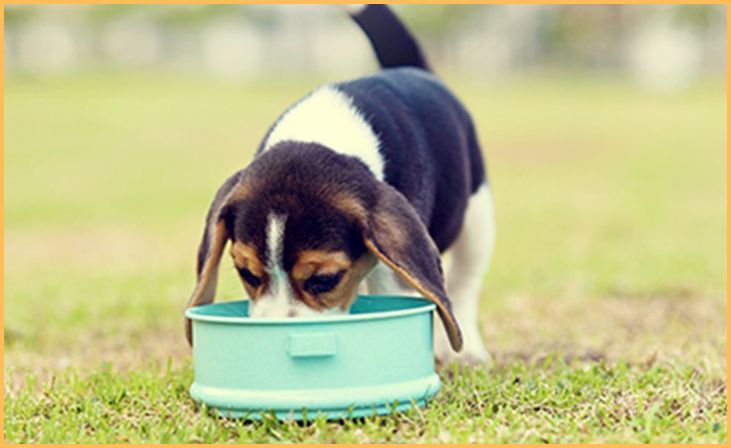
Your puppy’s growth and development depend on a healthy food that is just right for them. The first thing you should do to make sure your pet friend gets the right food is to talk to your vet. Your vet can help you figure out what kind of food is best for your baby, whether it’s dry kibble, wet canned food, or a mix of both, as well as the right amount to feed it based on its age, size, and breed.
Puppies have different dietary needs than adult dogs, mostly because they are growing so quickly. Look for high-quality baby food that has the right amount of proteins, carbs, fats, vitamins, and minerals to meet these needs. It should also have important nutrients like DHA, which helps the brain grow, and calcium, which keeps bones strong.
Set up a regular feeding plan to encourage healthy eating habits. Most dogs need to eat three to four times a day when they are young, but as they get older, you can slowly cut back to two to three times a day. Make sure there is always fresh water, and don’t overfeed to keep your pet from getting fat. This is the first tip on our How to Care for Your Puppy list.
2. Vaccinations and Preventive Care
Puppies can get a lot of different diseases, so vaccines are an important part of their care. Work closely with your vet to make a vaccination plan for your puppy that fits its needs. Depending on where you live and how common certain diseases are, common vaccines include shots for distemper, parvovirus, rabies, and more.
In addition to immunizations, preventive care includes protecting your baby from fleas, ticks, and intestinal worms. Your vet can suggest good preventive steps, such as topical treatments, pills by mouth, or collars. Taking these preventive steps is important if you want your puppy to be healthy and safe for the rest of its life. This is the second tip on our How to Care for Your Puppy list.
3. Regular Vet Checkups
Regular trips to the vet are essential to your puppy’s health and well-being as a whole. Not only will your puppy get vaccinated at these trips, but the vet will also check on its growth and development. Finding health problems early is very important because it gives doctors time to help.
Starting puppy wellness checks early sets the stage for good health for the rest of the dog’s life. Your vet will do full checkups, talk to you about any worries, advise how to care for your puppy, and let you know if any treatments are needed. A good relationship with your vet will ensure your puppy gets the best care possible for the rest of its life. This is the third tip on our How to Care for Your Puppy list.
Also Read: Longest Living Dog Breeds
4. Training and Socialization
Early training and socialization set the stage for having a dog who is well-adjusted and behaves well. Start with simple obeying commands like “sit,” “stay,” and “recall.” Using treats and praise, as well as other forms of positive feedback, can make learning fun for your puppy.
Socialization is just as important. Introduce your puppy to different places, people, other dogs, and events. This gives them more confidence, makes them less afraid and anxious in new situations, and helps them get along well with others. When you socialize your puppy early on, you set them up for a lifetime of good relationships and the ability to change. This is the fourth tip on our How to Care for Your Puppy list.
5. Exercise and Play
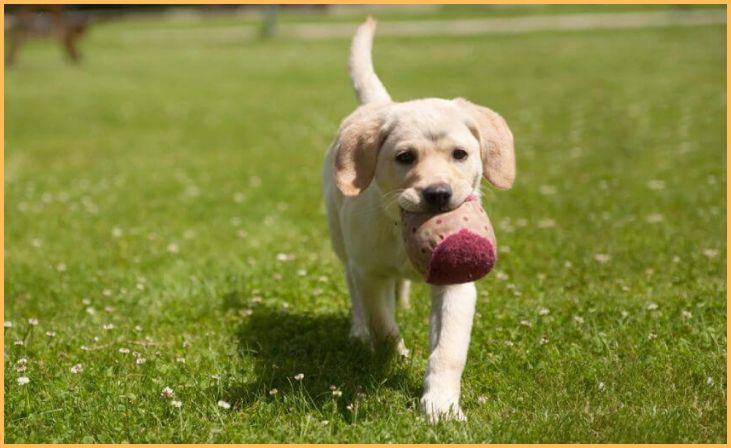
Puppies are full of energy, and it’s important for their physical and mental growth that they get regular exercise. Do things with your puppy that are right for his or her breed and amount of energy and that are age-appropriate. They can burn off energy by going for short walks, playing with toys, or playing “fetch.”
But it’s important to keep in mind your puppy’s size and physical abilities. Young dogs’ joints are still growing, so they shouldn’t do too much too soon. As they get bigger, gradually raise the intensity and length of their workouts to keep them from getting hurt.
6. Grooming
The breed of your dog will affect how it needs to be groomed. Most puppies must be brushed daily as part of their cleaning routine. This keeps their fur from getting matted and tangled. When they need to, they should take a bath, but be careful not to bathe them too much because that can strip their skin of natural oils and dry them.
Keep your puppy’s nails at a safe length by cutting them often. Start taking care of their teeth early, whether by brushing or giving them tooth chews.
7. Safe Environment
It is very important to make your home a safe place for your dog. Make your home safe for your puppy by finding and getting rid of possible dangers. This includes getting rid of poisonous plants, keeping chemicals and medicines out of your puppy’s reach, and putting away small items that he or she could swallow.
Also, keep an eye out for electrical cords, which pups might want to chew on. Use baby gates to keep people out of places that might be dangerous. Consider box training to give your puppy a safe place to stay when you can’t watch them. This is the seventh tip on our How to Care for Your Puppy list.
8. Crate Training
You can teach your dog where to go to the bathroom and give him or her a safe, comfortable place to sleep by crate training. Get your puppy used to the crate slowly so that it is a good experience. Use treats and toys to get your dog to like being in the crate.
Make sure the crate is big enough for your puppy to easily stand up, turn around, and sit down. As your puppy grows, change the size of the box. The package can also help you keep an eye on your puppy when you need to.
9. Consistent Routine
Dogs like routine, so it’s important to set up a set plan for each day. This schedule should include when to eat, go to the bathroom, play, and sleep. Your puppy will feel safer and housetraining will be easier if things are always the same.
To encourage good behavior, you should be patient and consistent in your approach. Consistency gives your puppy order and limits, which are important for his or her health and growth. This is the ninth thing you should do to take care of your puppy.
Also Read: Cute Maine Coon Cats
10. Love and Attention

Last but not least, give your puppy lots of love, care, and good things to do. Spend time together and show love by touching and praising each other. During training classes, treats and toys are great ways to motivate people.
You and your puppy must work together to build a strong bond. The love and care you give them now will help them become happy, well-adjusted, and loyal friends as they grow up. Your bond with your puppy will get stronger over time, creating a long-lasting bond that will make both of your lives better. This is the last thing we’ll tell you about how to take care of your puppy.
Taking care of a puppy is a rewarding journey that requires constant hard work and kindness. By following these detailed rules and asking your veterinarian for help, you can make sure that your puppy gets the best care possible. During their formative months, giving them a caring and loving environment will set them up for a lifetime of happiness and good health as they grow into a beloved adult friend.
Tips to Build a Strong Bond with Your New Puppy
After knowing how to care for your puppy, you must also know some tips to make your bong strong with your puppy.
It’s exciting and touching to bring a new puppy into your life. The road ahead is sure to be full of love, joy, and times you’ll never forget. As a new puppy parent, you’re about to start an adventure that will bring you and your new furry friend closer together.
1. Spend Quality Time Together

Give your dog a set amount of time every day. The bond between you and your furry friend gets stronger when you spend time together, whether it’s playing, cuddling, or just being in the same room. These times are the building blocks of trust and friendship.
2. Use Positive Reinforcement
Positive feedback is a great way to build trust and get people to work together. When your dog does something good, give it treats, praise, and love. This makes them feel good about you as their caretaker and makes them more likely to look to you for advice and help.
3. Socialize Your Puppy
Get your baby used to new people, animals, and places. Socializing builds confidence and helps people get along well with each other. A well-socialized baby is more likely to be flexible, calm, and less likely to be scared or anxious in new places.
Also Read: Most Popular Cat Breeds
4. Gentle Handling
Be gentle and patient with your dog, especially when you are grooming it, cutting its nails, or taking it to the vet. This builds trust and makes sure your puppy feels safe and secure when you’re taking care of it. Getting them used to being handled in different ways over time gives them a sense of comfort.
5. Training Sessions
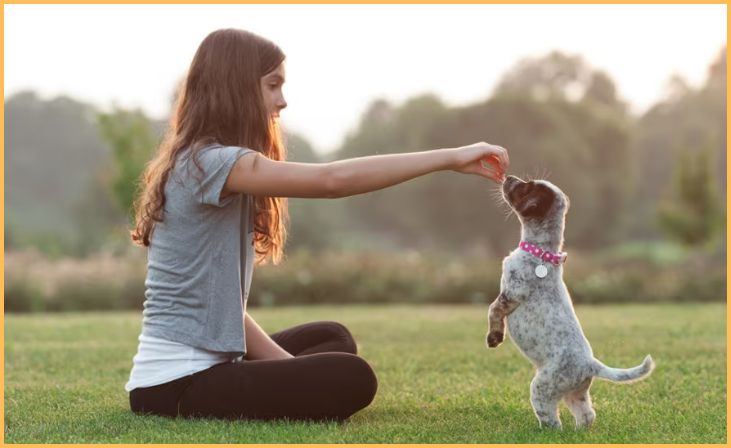
Short training lessons that are fun are a good way to teach basic commands and reinforce obedience. Training teaches your dog how to behave well and strengthens your bond with it. During training, the feeling of accomplishment and teamwork you and your partner feel can be very rewarding.
6. Be Consistent
When getting close to your dog, consistency is very important. Set up regular times for eating, going to the bathroom, playing, and training. Predictability gives your puppy a sense of order and builds trust, which helps them feel safe in their new home.
7. Play Interactive Games
Playing fetch, tug-of-war, or hide-and-seek with your dog is fun and good for its mind. These activities make you more playful, improve your physical balance, and bring you closer together as you laugh and have fun together.
8. Allow Exploration
Make sure your puppy has a safe place to explore and learn new things. Giving them the chance to satisfy their curiosity and sense of excitement helps them become more confident and self-reliant. Watch them as they explore to make sure they are safe and to encourage their natural interest.
Also Read: Toy Dog Breeds
9. Offer Affection
Physical touch is a key part of making your relationship stronger. Gentle touching, rubbing the puppy’s belly, and cuddling show you care and make the puppy feel better. These sweet times remind your partner that you are a loving and reliable friend.
10. Patience and Understanding

Remember that it takes time to get close to your new puppy. Be patient and kind as you and your partner get used to living together. Consistent training and socializing will pay off, and the trust and love you build along the way will make the trip even more enjoyable. Enjoy every step of this amazing journey, knowing that the bond you’re making with your puppy will last a lifetime and bring you both a lot of happiness and friendship.
7 Tips for Choosing Healthy Dog Food for Puppies
Bringing a puppy into your home is an exciting and rewarding experience, but it also comes with great responsibility, especially when it comes to their nutrition. Proper nutrition is crucial for a puppy’s growth and development, setting the foundation for a long and healthy life. In this article, we’ll explore essential tips for choosing healthy dog food for your precious pup.
Check the Ingredients
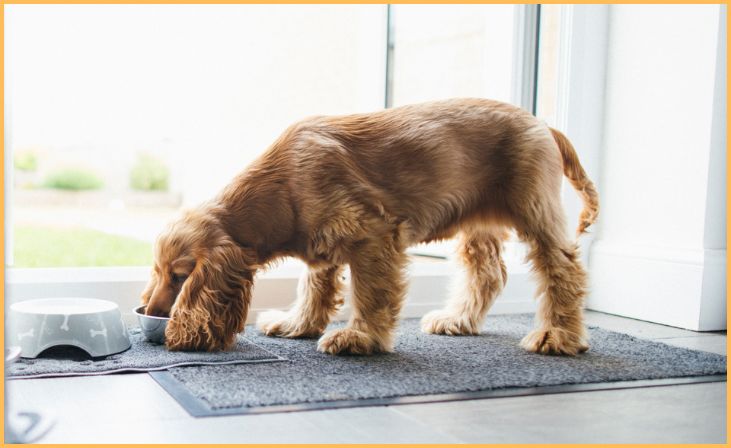
The first step in selecting the right puppy food is to carefully examine the ingredients list. Look for high-quality protein sources such as chicken, turkey, or fish listed as the first ingredients. Protein is essential for your puppy’s muscle development and overall health. Avoid foods with vague or generic terms like “meat” or “animal by-products.”
Age-Appropriate Formula
Puppies’ nutritional needs are different from those of grown dogs. Therefore, it’s essential to choose a puppy-specific formula. These formulas are specially designed to provide the right balance of nutrients required for growth. They typically contain higher levels of protein, fat, and essential vitamins and minerals to support your puppy’s development.
Avoid Artificial Additives
When selecting puppy food, opt for products that do not contain artificial colors, flavors, or preservatives. These additives can be harsh on a puppy’s developing digestive system and may lead to allergies or other health issues. Natural ingredients are gentler on your puppy’s sensitive stomach and overall well-being.
Consider Size and Breed
Keep in mind that different breeds and sizes of puppies have varying growth rates and nutritional requirements. Large breed puppies, for example, need controlled calcium levels to prevent bone and joint issues. Consult with your veterinarian to determine the right type of food for your puppy based on their size and breed.
Consult Your Veterinarian
Your veterinarian is your best source of guidance when it comes to choosing the ideal food for your puppy. They can consider factors such as your puppy’s health condition, dietary sensitivities, and specific nutritional needs. A veterinarian’s expert advice ensures that your puppy receives the most appropriate and tailored diet.
Look for the AAFCO Statement
Standards for cat food are set by the Association of American Feed Control Officials (AAFCO). Ensure that the puppy food you select has an AAFCO statement on the packaging. This statement verifies that the food is nutritionally complete and balanced, meeting the essential requirements for your puppy’s health.
Real Meat Over By-Products
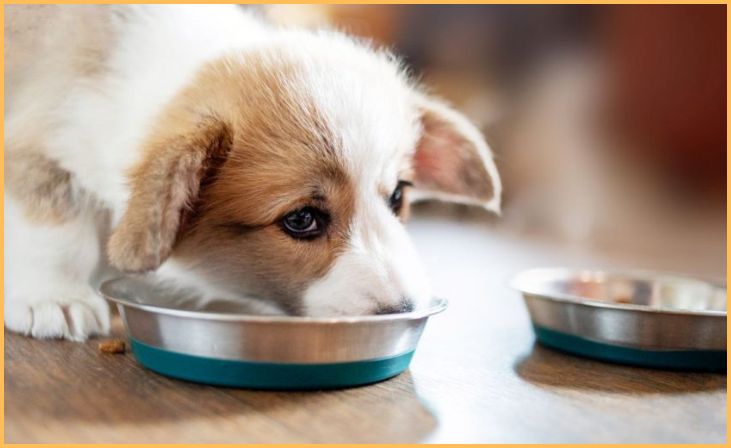
When reading the ingredients, prioritize foods with named meat sources. For instance, “chicken meal” is preferable to “poultry by-products.” Named meat sources provide higher-quality protein, and you can be more confident about the protein’s origin and quality.
Choosing the right puppy food is critical in ensuring your furry friend’s health and happiness. By following these guidelines and seeking guidance from your veterinarian, you can provide your puppy with the nutrition they need to thrive and enjoy a long, healthy life by your side.
We’ve talked about how to take care of your dog here. When you bring a new puppy into your life, you start a fantastic journey full of happiness, friendship, and love. Building a strong relationship with your furry friend isn’t just a goal; it’s a promise for life that improves both of your lives.
By spending valuable time together, using positive reinforcement, exposing your puppy to other people and animals, being gentle with them, and training and playing with them, you’re building a lasting bond. This long-lasting relationship is built on consistency, patience, and understanding. It will give you unwavering loyalty and heartwarming times.
As you go through this exciting journey, keep in mind that the bond you’re making is a priceless gift. Enjoy each day, take on each task, and celebrate each victory. Your new puppy is more than just a pet—he or she is a loved part of your family, and the love you share will make you happy for years to come. We hope this blog has answered all your questions about how to take care of your dog.
FAQs
Building a good relationship with your puppy takes time and is different for each puppy. Deep connections can take weeks or even months to form. The most important things are consistency, patience, and good relationships.
Socializing your puppy is very important. It helps them grow up to be happy, confident dogs. When animals are socialized well, they are less likely to be afraid of people, other animals, or new places and act scared or aggressively toward them.

